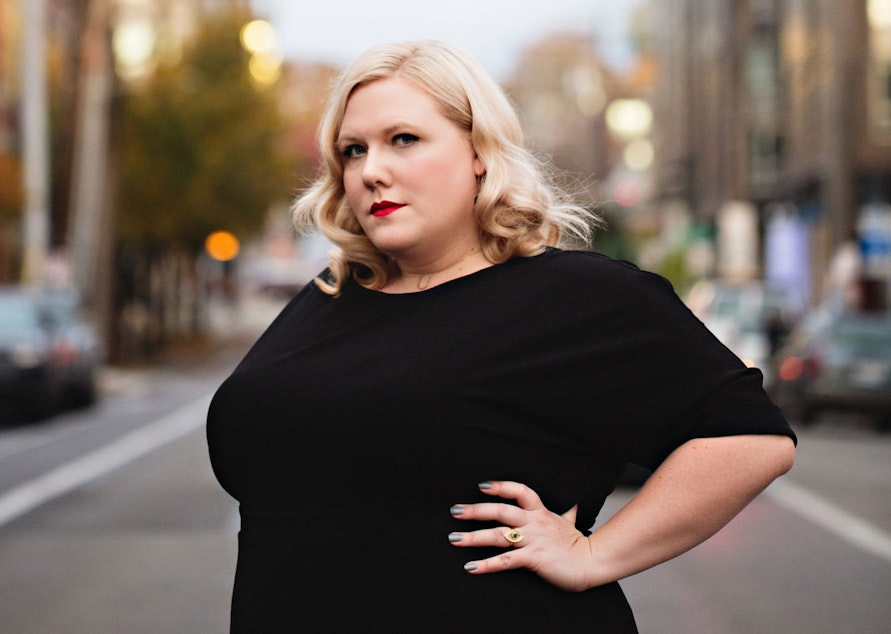Lindy West: From 'broken thin person' to badass lady knight

Jeannie Yandel talks to Seattle writer Lindy West about her new book, "Shrill: Notes From A Loud Woman." In it West talks about how she found her voice, reclaimed the word "fat" and began fighting misogyny on the internet.
On what being fat meant to her:
I realized I had been waiting. I had been waiting to really fully engage in my life because I felt like I wasn’t ‘me’ yet, because that’s what they sell you.
That’s how the diet industry works: When you pay enough money for our services and you stop being lazy and you finally become the real you – then you can have all the stuff you want. You can fall in love and be successful.
And I really bought into that and then at a certain point I started dismantling it in my head and I was just done.
Sponsored
On calling out her boss Dan Savage at the Stranger about his coverage of fat people.
At the time it was really easy to talk about fat people like an abstraction, like an economic and political problem to be solved and to pretend like there weren’t fat people around you in your life and working in your office with you and being your friend.
It was this politicized conversation where it was totally acceptable to say we need to eradicate fat people as though there weren’t fat people listening, who are people, who are in control and in charge of their own lives.
I thought of it at the time as a coming out process. Because when you believe that you are just a broken thin person, you don’t self-identify as fat. And if you don’t self-identify as fat, how do you advocate for yourself and ask people to treat fat people better?
Why do you think it is an important to call people out who have said, frankly awful, scary things?
Sponsored
Some people are really, viscerally scary. And those ones I don't really touch. I report those and block them. I haven't gotten to the point where I was afraid enough to contact the police, but that's what I would do if it was a really specific scary threat.
There’s a level of violent, but not so specific, just kind of unsettling threats that you get. With those I don't usually respond to people directly, but I do sometimes post them, because I think that a lot of people don't know the extent of this problem and what especially female writers and journalists are putting up with all day every day.
Cumulatively, it's really scary and it really makes you feel unsafe and targeted. So one big reason why I engage with trolls on the internet is to make the problem visible to other people who aren't living with my Twitter feed.
There a lot of younger women who are just thinking about entering journalism or writing or blogging who are nervous and who write to me and say, ‘I want to do this, but I'm scared of trolls and I'm scared of being harassed.’
And so I feel like if I can talk back and fight back in a public way and embolden some of those women to maybe not be so scared and give them a script for dealing with their own trolls and be a model for how you can still do this job and not be chased away – that’s really important to me.
Sponsored
Do you think it’s been worth the cost of having to build up a kind of armor to protect yourself?
It’s definitely made me stronger. I used to be painfully shy and the worst thing I could imagine was someone detecting my deepest insecurity and making fun of me for it. And now that happens to me every day.
It’s powerful that I've learned how to deal with that, it makes life a lot less scary. And I really feel like as painful as it's been I've learned a lot from being constantly harassed on the internet because it makes you face your biggest anxiety, which has always been people being mean to me people not liking me.
When do you get to stop fighting and hand the sword to someone else?
Soon probably. I'm bored of it. I am tired.
Sponsored
I don't have to do it forever. There are all kinds of really smart, radical young people who are taking over these internet spaces.
I don't know how to fix internet trolling. I know how to critique culture, which I think is maybe the key component.
You know the problem isn't that Twitter exists, it's that misogyny exists. So that's the most effective way I can spend my time is writing the feminist cultural critique. And I hope that I contributed in some way to people feeling like they can fight and they know how to.
These quotes have been lightly edited & condensed for clarity.

